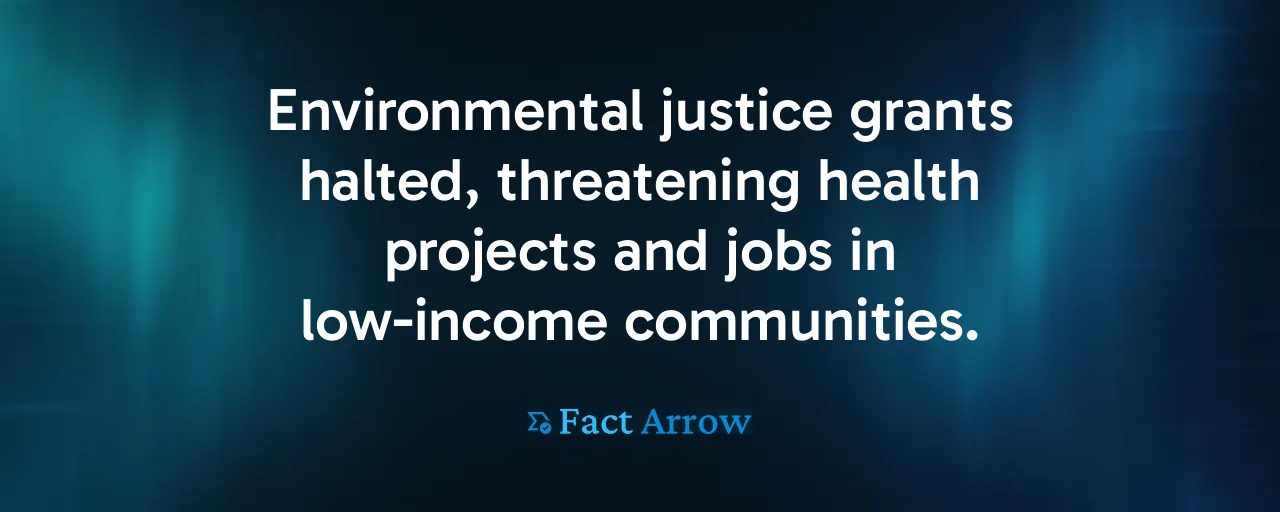EPA Grant Cuts Impact Environmental Progress
In early 2025, the U.S. Environmental Protection Agency made a devastating decision. It canceled over $2.4 billion in grants meant to clean up pollution, improve public health, and strengthen climate resilience in some of the nation's most vulnerable communities.
This funding, part of the Environmental and Climate Justice Block Grant program, was secured through the 2022 Inflation Reduction Act to deliver clean air, safe water, and healthier homes to neighborhoods long burdened by environmental harm.
The decision hit hard. In California alone, 40 organizations, from nonprofits to tribal governments, lost $301 million for projects like removing lead pipes and reducing air pollution. Across the country, more than 380 grantees saw their plans grind to a halt. Community leaders, who had spent years preparing for these funds, were left scrambling.
A coalition of 20 state attorneys general, led by California's Rob Bonta, quickly fired back. They filed a legal brief supporting a class action lawsuit against the EPA, arguing the agency's move was harmful and illegal. The brief, joined by groups like Earthjustice, claims the EPA violated Congress's clear instructions to deliver these funds. This legal battle seeks justice for communities that have faced pollution's worst effects for decades, alongside the financial implications.
Communities Left in the Dust
The grants were a lifeline for places often ignored. Low-income neighborhoods, tribal lands, and communities of color, where pollution drives up asthma and cancer rates, stood to gain the most. Data shows these areas face higher exposure to toxins, with children in high-pollution zones twice as likely to develop respiratory issues. The canceled projects included air quality monitors, water treatment upgrades, and urban tree planting to combat heat.
In California's Central Valley, one nonprofit planned to use $10 million to replace diesel school buses with electric ones, cutting emissions that impact local children's health. That project is now on hold. In Michigan, a tribal community lost funding to clean up a contaminated river. These losses directly affect real people, leading to dirtier air and riskier water.
The human cost is clear. Studies estimate that every dollar spent on environmental justice projects saves three to five dollars in healthcare costs by reducing illnesses tied to pollution. Beyond health, the grants promised jobs, with over 5,000 positions in clean energy and construction now at risk. For communities already stretched thin, the EPA's decision feels like a betrayal.
A Violation of Trust and Law
The legal case against the EPA hinges on a simple principle: Congress decides how taxpayer money is spent. The Inflation Reduction Act explicitly set aside $3 billion for these grants, amending the Clean Air Act to ensure the funds reached disadvantaged communities. By canceling them, the EPA ignored that mandate, attorneys general argue. Courts have already signaled agreement, with one ruling in June 2025 calling the EPA's action arbitrary and unlawful.
Administrations have previously attempted to block environmental funds. In 1975, a landmark case, Train v. City of New York, stopped the Nixon administration from withholding pollution-control money. Today's lawsuit draws on that precedent, asserting that the EPA can't override Congress's will. Legal experts say the plaintiffs have a strong case, given the clear language of the law.
Beyond legality, the move erodes trust. Nonprofits and local governments spent months applying for these grants, often matching federal funds with their own. Now, with projects paused, they face layoffs and wasted resources. The ripple effects could discourage future applicants, weakening the nation's ability to tackle environmental challenges.
The Bigger Picture of Justice
The concept of environmental justice has a long history. It began gaining traction in the 1990s, when advocates pushed for fair treatment of communities hit hardest by pollution. The 2022 Inflation Reduction Act marked a historic step, dedicating billions to make that vision real. The grants were part of a broader push, including the Justice40 initiative, which aims to direct 40 percent of federal climate investments to underserved areas.
Canceling these funds stops projects and also undermines decades of work to address systemic inequities. Communities near factories or highways, often home to people of color or low-income families, have long borne the brunt of pollution while wealthier areas escaped. The grants were a chance to level that playing field, offering resources to fight back against environmental harm.
Advocates argue that restoring the funds honors commitments to those who have been overlooked, extending beyond the scope of a single program. It concerns ensuring that clean air and water are rights for everyone, regardless of their zip code.
A Path to Restoration
The lawsuit offers hope. If courts rule in favor of the plaintiffs, the EPA could be forced to reinstate the grants, allowing projects to resume. But time is tight. The Inflation Reduction Act's funds expire in 2026, and delays could raise costs or derail timelines. A swift injunction is critical to keeping these efforts alive.
Beyond the courts, Congress could step in. Lawmakers could strengthen rules to prevent future administrations from blocking funds, ensuring that environmental justice remains a priority. Expanding programs like Justice40 could also build on the grants' momentum, bringing more resources to communities in need.
For now, the fight continues. From California to Michigan, advocates, attorneys, and local leaders are standing up for their communities. They are defending the principle that every person deserves a healthy environment, as well as the allocated funds. As this battle unfolds, it's a reminder that progress, though hard-won, is worth the effort.
